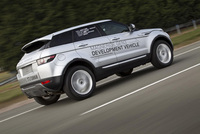Range Rover Evoque to feature MagneRide ride control technology

The third generation of BWI Group’s MagneRide is entering production on the Range Rover Evoque as its Adaptive Dynamics technology. The addition of a twin-wire dual coil actuator to the system provides faster response and a greater range of damping control, to deliver very high levels of traction, stability and comfort both on and off the road. BWI Group also supplies the passive twin-tube dampers for the vehicle’s standard suspension configuration. BWI has a long history of supplying premium dampers for off-road vehicles.
“With around half a million units already produced, MagneRide technology is robust and well-proven on high-performance cars, supercars and large SUVs,” says BWI’s manager, forward engineering controlled suspensions, Olivier Raynauld. “The third generation of MagneRide, with faster response and wider dynamic range, effectively removes the need for chassis engineers to compromise between comfort and handling - whether driving over rocky tracks or smooth highways. We are proud of its contribution to the Range Rover Evoque’s outstanding driving experience.”
MagneRide uses a Magneto Rheological (MR) damper fluid which contains tiny metallic particles that can be quickly but temporarily magnetised by energising electrical coils in the damper piston. When the current is off, the particles are randomly dispersed and the damper is in its softest setting. Applying a current magnetises the particles, which then attract each other in proportion to the strength of the magnetic field, increasing the resistance to flow and stiffening the damping. The result is an ability to vary the damping force almost instantaneously over a wide range, just by varying the current applied. The system has low energy requirements of typically less than 20W per damper.
The third generation of the system replaces the damper’s single electrical coil with two smaller coils, and a bespoke ECU with optimised control algorithms. The changes provide quicker ‘current-off’ performance, giving the new system a faster transient response that helps to isolate the vehicle occupants from the texture of the terrain, especially when driving off-road.
The new dual-coil architecture also helps to extend the dampers’ dynamic range (a ‘softer soft’ and a ‘harder hard’), even at the low body velocities typical of off-road driving that are difficult to control with conventional damping technologies. As well as directly improving comfort and handling, this allows the influence of the roll bars and springs to be reduced, improving a further area of ride-handling compromise that can be particularly challenging for off-road vehicles.
Unlike conventional semi-active suspension systems that use complex electro-mechanical valving, MagneRide is mechanically very simple, having no small moving parts and fewer parts overall than a traditional passive damper. There is no off-road button to push and, unlike conventional active suspension systems, the response is always proportional, not stepped. Regardless of the Evoque’s Terrain Selector position, the technology provides the optimum contact between the tyres and the road surface and the best compromise between response and comfort.
“Land Rover wanted a new level of suspension control for the Evoque,” explains Raynauld. “Adaptive Dynamics, using BWI’s MagneRide dampers provides that control across all road surfaces and under all conditions.”

